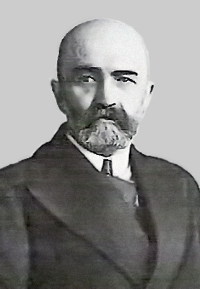Walery Sławek
Walery Sławek in January alias Gustaw (* 2. November 1879 in Strutynka b. Nemyriw ; † 3. April 1939 in Warsaw ) was a Polish Freemasons , PPS - politicians , founder of the Nonpartisan Bloc for Cooperation with the Government , one of the closest collaborator Jozef Pilsudski , one of the Sanacja leader and three-time Prime Minister of Poland as well as Sejm Marshal ( June 22, 1938 - November 27, 1938).
Sławek came from an impoverished Szlachta family from Strutynka near Niemirowo . During the revolution of 1905 he was a member of the PPS combat organization . Together with Piłsudski he founded paramilitary combat groups and became an officer in the 1st Polish Brigade and founder of the POW during the First World War . After the 1st and 3rd Polish Brigade refused to take the emperor's oath of allegiance, he was imprisoned by the Germans in the Warsaw Citadel , in Szczypiorno and Modlin and only released after the German defeat on November 12, 1918 . During the Polish-Soviet War he was the head of the secret service and head of the political department.
In 1928 he founded the BBWR to support the government camps and became its leader and chief ideologist after its unexpected electoral success. He held the office of Prime Minister three times:
- from March 29, 1930 to August 23, 1930
- from December 4, 1930 to May 26, 1931
- from March 28, 1935 to October 12, 1935
and was acted as president in 1935. Most of the amendments to the Basic Law of the April 1935 Constitution came from his pen. After Piłsudski's death, however, Sławek lost its influence and importance, although he briefly became a Sejm Marshal after the death of Stanisław Car in 1938 .
Sławek turned a gun on himself at 8:45 p.m. on April 2, 1939 and died at 6:45 a.m. the next day in a military hospital in Warsaw .
Web links
- Biography on the homepage of the government chancellery (Polish)
- Newspaper article about Walery Sławek in the press kit 20th Century of the ZBW - Leibniz Information Center for Economy .
Footnotes
- ^ Government lists of the Second Polish Republic in the documents and materials on East Central European history
| personal data | |
|---|---|
| SURNAME | Slawek, Walery |
| BRIEF DESCRIPTION | Polish politician, member of the Sejm, Prime Minister of Poland and Sejm Marshal |
| DATE OF BIRTH | November 2, 1879 |
| PLACE OF BIRTH | Strutynka b. Nemyriv |
| DATE OF DEATH | April 3, 1939 |
| Place of death | Warsaw |
